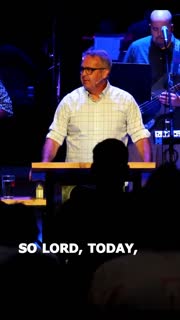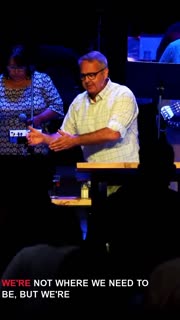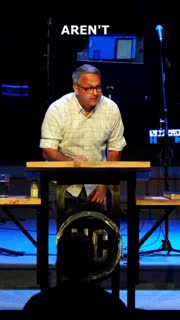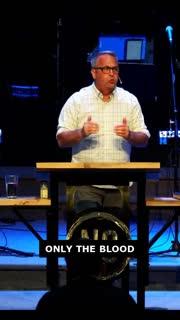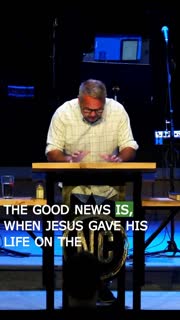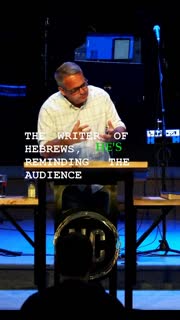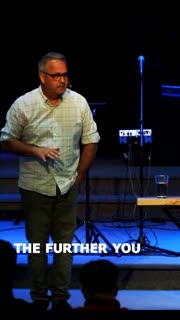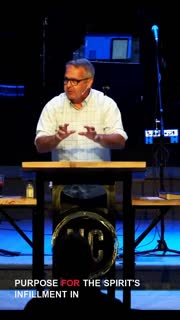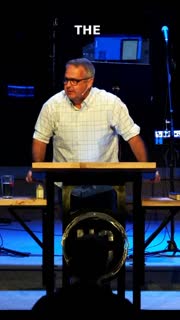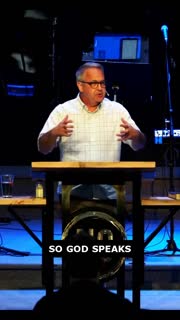Free. Yes, Jesus, hallelujah.
I just sensed that as we were worshiping, the Holy Spirit speaking in my heart about the posture of our heart. Because it's so important when we come into God's presence. And I, like you, can be caught up in thinking about what's going on the rest of the day. What's going to happen this week? What's going to happen this week? Or in a couple weeks? Or in a month? And let my heart wander, let my mind wander to places that are not a part of this most reverent and holy time. Where we are locked in worship of the very one who created us.
And so what I felt the Holy Spirit saying to me is, "Bob, don't forget to remind the people that this is a holy moment. This is a moment where we are communicating with our Creator. This is a moment where we are reverencing this time in our gathering where we are worshiping the most high and holy God. He is the God of all ages. The Bible calls Him the beginning and the end. The Alpha and the Omega. The Bible calls Him many names. And one of those is Jehovah Jireh, the God who provides. Jehovah Rapha, the God who heals.
And in this moment, I believe that rather than let our minds and our hearts wander to things that are temporary, let's bring our focus back to things that are eternal. That is our God.
So Lord, today, as we have sung these songs of worship, it is my prayer that our hearts and minds have not wandered away from this moment. Lord, that we have captured the here and now. That we have captured Your holy presence. That we have dug our heels in against the distractions, and released our burdens to You.
Lord, I pray today that in this moment that You have spoken to hearts. That You have dug into some places where we need You to. That You have cleaned out some spaces in our lives that we've needed You to for a long time.
Lord, as we have come into this place, into Your house, and worshiped with Your people, I pray that You would continue to speak to us today and let us not soon forget what we used to be, but what we are now.
We're not where we need to be, but we're a lot farther from where we used to be. And for that, God, we say thank You. And we give You praise and we give You honor.
We honor Your presence in this house. We honor Your name in this house. We honor Your Son, Jesus Christ, in this house. We honor the Holy Spirit in this house. Because there is none other like You, God. And we thank You, Lord, and give You praise.
Lord, today, we turn our attention to a solemn moment of prayer for a family in Spokane that is suffering a great tragedy right now. Lord, we pray for the family of 13-year-old Addie, who was drowned at Clear Lake, Lord. Can't even imagine what the parents are going through.
And Lord, we pray for Pastor Brian Herrick at Journey Church. And Lord, we pray for the family of 13-year-old Addie, who is in Spokane, that You would give him and his wife wisdom in ministering to this family. There's a lot of complicated layers in what's happened, Lord. And we just pray that You would unite and not let the enemy divide.
Father, we thank You. We thank You for Your ongoing presence in our lives. And we pray that for this family right now in the name of Jesus Christ, that there would be healing and restoration that would take place. But most importantly, Jesus, that by Your Holy Spirit, You would bring comfort and solace where there is grieving and sorrow.
And Lord, we thank You for that. And we give You praise in Your precious name. And Lord, for the rest of our time together and diving into Your Word, I pray that You would speak to us. And we give You honor in Jesus' name.
And everyone said, Amen. Amen. You may be seated today.
I invite you to continue to pray for this family who tragically lost this little girl. As soon as Carol told me the news, Aletha called Carol, and as soon as she told me the news, I was just devastated for them because I can't even imagine what that even would be like. And so I invite you to continue to pray for them.
This morning, I just received news as well that we need to congratulate Jeff Kinsey's daughter and son-in-law, Megan and Adam Smith, at the birth of their baby boy, Cooper Patrick Smith. And so we celebrate with them. Baby and mother, I should say, are doing just fine. And we praise the Lord for that.
If you remember right, we were praying for Megan during this pregnancy, that God would just bring this little life into the world, and He has. And so now they get the joy of enjoying Him. And I know little Maddie is going to love having a little brother to boss around. And so... And she will do just that. So we're excited for them.
I'd like you to take your Bibles and turn to the book of Hebrews chapter 9, if you will. This morning, I need you to put your thinking cap on for an experience of a journey through the Old Testament tabernacle. And later on in this message, we're going to show some pictures just to illustrate what that tabernacle looked like and what it was all about.
And so just put on your thinking cap as we read chapter 9, verses 1 through 10. We're going to break these down, break this passage of Scripture down in sections as we move through it.
I want to give you five reasons today that the Old Testament tabernacle was inferior to what is in store for us in heaven. And so let's walk through this. Starting with verse 1, you can read it with me in your Bibles. If not, it'll be on the screens in front of you. So let's read together.
Now, the first covenant had regulations for worship and also an earthly sanctuary. A tabernacle was set up. In its first room were the lampstand and the table with its consecrated bread. This was called the holy place. Behind the second curtain was a room called the most holy place, which had the golden altar of incense and the gold-covered ark of the covenant. This ark contained the gold jar of manna, Aaron's staff that had budded, and the stone tablets of the covenant. Above the ark were the cherubim of the glory overshadowing the atonement cover. But we cannot discuss these things in detail now.
When everything had been arranged like this, the priest entered regularly into the outer room to carry on their ministry. But only the high priest entered the inner room, and that only once a year and never without blood, which he offered for himself and for the sins the people had committed in ignorance. The Holy Spirit was showing by this that the way into the most holy place had not yet been disclosed as long as the first tabernacle was still functioning. This is an illustration for the present time, indicating that the gifts and sacrifices being offered were not able to clear the conscience of the worshiper. They are only a matter of food and drink and various ceremonial washings, external regulations applying until the time of the new order.
Father, today, again, we ask that you would just speak to us through your word. We thank you for your word because it is powerful. And Lord, help us to learn it, memorize it, and grow from it so that we can extinguish the fiery darts of the enemy as your word instructs us to.
Lord, we pray today for a transformation to take place in each and every one of us that we would literally see our lives for what we are and see you for who you are. God, we are broken. You are not. You are holy. You are just. You are righteous. And so, God, help us to take inventory as we walk through this message of our own lives and help us to be changed from the inside out. In Jesus' name.
And everyone said, Amen.
So we're going to go into the book of Hebrews. The first section of the book of Hebrews talked about Jesus being superior or Jesus as best. And the second section that we're walking through now talks about how the new covenant is better than the old covenant. And so we're going to understand and unpack some things about this scripture that hopefully answer some questions you might have concerning what we just read.
I know sometimes the Bible can be, when it was written, it can be kind of in an archaic language and it's hard to understand sometimes. And so hopefully we can explain it in a way that it will make sense to you and you'll walk away going, "Oh, okay, I get it now." How many like those moments where you do that? "Oh, I get it now." Right? We all like those moments and so I'm hoping that you have that moment as we walk through this.
So the writer of Hebrews, he's reminding the audience of the practices of the Old Testament. And he wants to divert their attention from the old, which is what they want to return to. They want to exchange the life they now have in Christ to go back to the old practices. And he's trying to divert their attention to get them to understand that those things are what once was and they need to focus on what is now and what will be in the future.
And how many of you know from experience that every once in a while we need to be reminded of what once was while we have the experience of the here and now because our mind and our heart sometimes wanders to the once was. And you know what? Here's the thing, and I'm sure you've experienced this already. We're going to get bruised on this journey. We're going to get injured. We're going to get weary. We're going to get tired of the road. And we will be tempted sometimes to set our sights on what used to be because what used to be brings with it a certain familiarity and a comfort.
How many of you can agree with that? What used to be is where we came from. And what God wants to do is bring us somewhere new. God's Word didn't say, "Behold, I am doing a familiar or comfortable thing." Amen? His Word did not say, "Behold, I am bringing back an old way of doing things."
God's speaking to the nation of Israel in Isaiah chapter 43 verses 18 and 19 stated this, "Forget the former things." How many of you know we need to hear that inside our hearts and minds sometimes when we're looking back to the old things? We need to hear the Holy Spirit speaking to us, washing over our mind and our heart. "Forget the former things. Forget the old things." Because he says, "Do not dwell on the past."
How many today would say, "I have a past?" Come on. We have a past. "Do not dwell on the past." Then he says, "See, I am doing a new thing." Aren't you glad Jesus is doing a new thing inside of you today? He goes on to say, "Now it springs up. Do you not perceive it? I am making a way in the wilderness and streams in the wasteland."
The entire book of Isaiah prophesies of a day when things would be made new by the birth of one child that would bear the weight of the sins of the world on his shoulders and become the once and for all sacrifice for all of humanity. In fact, Isaiah foretold that this child who would be God wrapped in human flesh would bring a kingdom that knows no end.
So God speaks through Isaiah to inform the nation of Israel to not dwell on what used to be but what will be. Now, approximately 750 to 800 years exist between Isaiah's prophecies and the writing of the book of Hebrews. But can I tell you today, the message is no different. God is doing a new thing.
How many can say that God is doing a new thing in your life right now? That something is happening inside of you that you've never experienced before and maybe you've been serving Jesus for a very long time and you couldn't explain it in words but you just feel like God is doing something new in you. Because that's the way Jesus works in all of us.
So this is the stage for our message this morning. What a tragedy it would be to have experienced the wonderful and amazing grace of God, of a loving God only to return to what once was. We need to talk about the old being made new today.
So the old tabernacle, you have to understand, was a marvel in its time. It was constructed with the finest materials of gold, linen, and the sturdiest of wood that was decorated with ornate carvings. So what made the old tabernacle inferior in its worship practices? After all, God was the one that set it all in motion, right? He instructed the nation of Israel to give. He instructed men to build this tabernacle and it was the most beautiful edifice or structure in its time.
So what made it inferior? The writer of Hebrews is not implying that God had made poor decisions in the way Israel was to worship. Remember, God always had a plan of salvation in mind, amen? And also remember that there was an appointed time for Jesus to come onto this planet to step into our world and bridge or reconnect us to the Heavenly Father.
So there had to be an intermediate plan to help keep the people focused on God and His leading. And this is the reason for the tabernacle and its sacrificial worship. Now if you remember from a previous message, the tabernacle was at the center of the nation's encampment. And the encampment, if you were to get a top view of it, actually looked like a cross with all the tribes of Israel around the tent of meeting. But it was right in the center.
But God also knew that this was a temporary plan. So there are five reasons I want to give to you from our text today that explain why the earthly tabernacle was not enough to meet the real needs of man, of God's people. So let's dive in.
The first one is this: It was made of earthly materials. Hebrews 9:1 says, "Now the first covenant had regulations for worship and also an earthly sanctuary." It was constructed from earthly materials from human hands.
Now when the Lord instructed Israel to move from one location to another, it had to be taken down. And when they got to the next location, it had to be set up all by human hands. And when the call was made for offerings to start building this wonderful new tabernacle, the people, the Bible says that the people were extremely generous in their giving and they brought their gifts to Moses and said, "I'm going to build a new tabernacle."
And these materials were constructed the finest mobile church you have ever seen. Now there was a period of time in Neighborhood Church's history when we were a mobile church. We called it Church in a Van. We had sold our facility, we moved into the high school auditorium, and every single week, Sunday morning early, we took all of our equipment out of the van, set it up in the high school auditorium, and that evening, we would tear it down, put it all back in the van.
We got to be master packers of this equipment. It was absolutely incredible. And then we would clean the high school and be done. And we'd do that same thing next Sunday. We did that for a year and a half. A year and a half. So I can tell you all about mobile church. Mobile church isn't fun.
And here in the nation of Israel, can you imagine packing a tabernacle and its outer courts that were that big? Packing it all up, moving it, and then setting it back up whatever location the Lord led you to. So when God chose people to skillfully construct this tabernacle, He chose several skilled laborers. But there's only two that He mentions in the Bible.
In Exodus chapter 31, verse 1, it is Bezalel and Oholiah. Now Bezalel was a craftsman. And the Bible says, and he's the only one of all of them that the Bible says this about, but you can assume that the Spirit of God rested on all of the other workers that were constructing the tabernacle of God. But Bezalel, it says, he was filled with the Holy Spirit.
Let me read it to you. In verse 1 of 31 of the book of Exodus, "Then the Lord said to Moses, 'See, I have chosen Bezalel, son of Uriah, son of Hur, of the tribe of Judah, and I have filled him with the Spirit of God, with wisdom, with understanding, with knowledge, and with all kinds of skills to make artistic designs for work in gold, silver, and bronze, to cut and set stones, to work in wood, and to engage in all kinds of crafts. Moreover, I have appointed Oholiah, the son of Ahisamek, of the tribe of Dan, to help him. Also, I have given ability to all the skilled workers to make everything I have commanded you, the tent of meeting, the ark of the covenant, law with the atonement cover on it, and all the other furnishings of the tent, the table and its articles, the pure gold lampstand and all its accessories, the altar of incense, the altar of burnt offering, and all its utensils, the basin with its stand, and also the woven garments, both the sacred garments for Aaron the priest and the garments for his sons when they serve as priests, and the anointing of oil and fragrant incense for the holy place. They are to make them just as I commanded you.'"
So God speaks to Moses, his servant, and talks about Bezalel being filled with the Holy Spirit to do the work required. You have to understand this is a rare occurrence in the Old Testament. There are a few leaders and judges that the Bible says were also filled with the Spirit. There's Joshua, Othniel, Gideon, and Jephthah. They were all filled with the Spirit. These men were set apart to carry out the purpose that God had given them.
Now, fast forward to the day of Pentecost. What purpose did Jesus give the early church? To preach the gospel, to make disciples, to baptize. Who did he give the early church to carry out that purpose? The Holy Spirit. Remember in Acts it says, "But when the Spirit has come upon you, you will be my witnesses." The purpose for the Spirit's infillment in the life of believer is to preach the good news of the gospel of Jesus Christ.
So after these Spirit-filled men were finished with the construction of the tabernacle, it was set in place and dedicated to the God of Israel. And the Bible tells us that once it was dedicated, that the glory of God moved into the sanctuary, but it was still a building built of earthly elements and constructed by human hands.
The fact that this was an earthly building meant that it was only as strong as the elements it was created with, which meant that it had weaknesses. How many of you know the elements in this earth have weaknesses? And I believe that's because of the fall of man. I believe that if man had never fallen, that things would have existed forever, but that's not the way it worked out.
When the Lord instructed Israel to move from one location to another, the tent had to be disassembled and it had to be carried from place to place. And this tabernacle only belonged to the people of Israel. It was not a tabernacle for many tribes and many nations. It only belonged to them.
And how many of you know, since this was an earthly tabernacle, maintenance was required. I'm sure every few months or whatever, because they would tear it down. It was made of earthly elements.
Well, can I just tell you, that's exactly what we face here in this facility, in this church. We face maintenance costs all the time. This church is now over 20 years old, and there are certain things in this church that are starting to degrade and starting to go wrong. Like, for example, in the main office area and my side of the offices, there's no air conditioning right now. You want to know why? Because the compressor had a short in it and blew out our breaker.
So now we have to have the compressor fixed and the breaker fixed and all of that just to get air conditioning. You know what? Actually, it's been quite pleasant, to be honest with you. I haven't suffered at all from that. I haven't wilted away or anything. So we can make it without air conditioning, right? Some of you are saying, "No, can't."
Just a side note. I remember as a kid going to bed at night. We didn't have air conditioning. We couldn't afford air conditioning. And I slept on the top bunk because all three of us shared a room. There wasn't much room in our house. I slept on the top bunk. You know where the heat resides, right? Up here.
And so I can remember laying in bed at night, not allowing any limb of my body to touch each other because I was sweating so bad. We had a window that I would raise, but it didn't help hardly at all because it would just bring the heat in more. So we can survive without air conditioning.
Why am I saying all of that? I'm just saying this, that that early tabernacle was manmade. It was built with earthly elements, and it degraded at times and needed maintenance on it. So it was inferior to the one that is waiting for us in heaven.
Not only was it made of earthly materials, but the second reason we see the first tabernacle was not enough is that it was a foreshadow of something greater to come. It was a foreshadow of something greater to come. Hebrews 9:2 through 5 says, "A tabernacle was set up. In its first room were the lampstand and the table with its consecrated bread. This was called the holy place. Behind the second curtain was a room called the most holy place, which had the golden altar of incense and the gold-covered ark of the covenant. This ark contained the gold jar of manna, Aaron's staff that had budded, and the stone tablets of the covenant. Above the ark were the cherubim of the glory, overshadowing the atonement cover. But we cannot discuss these things in detail now."
So the writer lists the different parts that occupied space inside the tabernacle. Each one of the elements held a spiritual meaning. And I'm going to go through them as quickly as I possibly can because there's a lot of detail that I haven't even included in my message to cover as it relates to all of the items that are in the actual tabernacle itself.
So first of all, we take a journey there. And I've got a couple pictures I want to show you. So the first one, if we could put that up. So this is like a bird's-eye view of the tabernacle and the outer court as a whole. And I know you can't read the small writing, and I never meant for you to be able to do that. I just wanted you to see what it all looked like.
So you would enter into the curtain or the space there, and the first thing you would encounter is the brazen altar right there. And then the next thing would be the wash basin with its stand. And if we look at all of those items that were put in there, you have to understand that the outer court was for atonement, it was for worship, and was for cleansing and preparation to meet God.
There were two important pieces of furniture that occupied that space, as I told you. The brazen altar, or called the altar of burnt offerings, and the bronze basin and stand that was used for ceremonial washing. The outer court was open to all people, all the Israelites.
And you need to know this one thing, because this is important, and it plays out in our worship as a church and as individuals. The further you moved into the tabernacle, the more intimate the relationship got with God. Do you understand that?
Because at the outer court, there's nothing wrong with us being in the outer court, and I'm talking about a church. We all love to celebrate, right? We all love the fast songs and the songs that make us feel good when we're singing them. But the closer we get to God's presence, the more the Holy Spirit deals with us on the internal side.
We have no problem with the external. Some of us worship very openly and some not so much. But can we all just agree we have no problem with the external? With the high praise and fast songs and worshiping God in the outer court. But once we start making steps toward the holy place and the holy of holies, we're going to unpack that here in just a few moments, the relationship with God gets more intimate at that moment.
So in the holy of holies, there were three elements that all had a specific purpose. The first element was the table of presence. The second element, the golden lampstand. And the third element, the altar of incense.
Now I want to just communicate up front that theologians have a little trouble understanding if the altar of incense was actually in the holy of holies or if it was outside, positioned outside of the curtain of the holy of holies. Because it definitely had specific purposes of the ark of the covenant. And so we're going to get into that in just a little bit.
The purpose of the table of presence was to hold the bread of presence or the bread of the face as it's literally translated. There were 12 loaves of bread arranged in groups of six as an offering to God and a reminder of God's presence and provision that sustained them.
So God was saying to the nation of Israel, these 12 loaves of bread representing the 12 tribes of Israel is a reminder to you that I have sustained you and I will sustain you in any journey you are on. How many can thank the Lord that he has sustained you and he will sustain you with anything you go through?
Every Sabbath, the bread of the presence was replaced with 12 new loaves. As we stated, and I think Keith stated in a men's Bible study, and by the way, Keith, thanks for preaching to us last week. That was a great message. Appreciate that so much.
But every Sabbath, there needs to be fresh bread in God's house. Amen? We need to have a fresh word from the Lord in God's house. And this bread was also a foreshadow of Jesus being the bread of life and given to the entire world.
But so those loaves had to be replaced. And then the 12 loaves that were taken off the table were eaten only by the priest and only in the tabernacle.
Now directly across from the table of the bread of presence was the lampstand. Let's show that second picture real quick. So this is the inside of the tabernacle. You can see on the right side is the table of presence. Directly across from it is the golden lampstand.
Now you'll notice the tent doesn't have any windows at all. So the golden lampstand provided light, practically provided a light, but spiritually it symbolized the fact that the nation of Israel was to be the light to all nations. And that it was a foreshadow of Jesus who is the light of the world would come at a later point.
So everything in the tabernacle, you have to understand, points directly to Jesus. So you had the golden lampstand, which provided the light. In front of the entrance to the Holy of Holies, it was the altar of incense which reminded the nation of Israel to pray and that their prayers were sweet-smelling to the Lord.
Now the last room that we see there is the room called the Holy of Holies. It was the place where a priest went, the high priest went, and only once a year to atone for the sins of himself and the nation of Israel. He would go in there once a year and perform his ministry in there.
And the Ark of the Covenant was a gold-covered wooden chest that measured three feet nine inches long, two feet three inches wide, and two feet three inches high. On top was beautifully constructed mercy seat made of gold, and there was a cherub angel at each end. And this served as the throne of God most high in the tabernacle.
And when the Day of Atonement each year arrived, blood was sprinkled on the mercy seat to cover the tablets of the law inside of the Ark. And here's the cool thing about this, folks. God did not see the law. He saw the blood.
You know that Jesus Christ represents our mercy seat? And when His blood is sprinkled on us, God sees not our brokenness, but He sees the blood of His Son applied to our lives, and He sees us for what we will be, not what we used to be. Amen? Aren't you glad for that?
But here's the thing about Jesus' blood. It doesn't just cover sin. It removes it. It takes it away from our lives. And all the items represented in that first earthly tabernacle were symbolic of something greater to come. And that's why the old tabernacle is inferior.
It was inferior to the old tabernacle. It was inferior because it was made of earth and materials, and it was a foreshadow of something greater to come. And it was inferior because not everyone had access.
How many of you like to be excluded from things? I mean, there's some things you definitely don't mind if you're excluded from. But if it's something good, you don't like to be excluded. You know, when your friend gets, or your neighbor gets an invite somewhere, but you don't get the invite, how does that feel? That doesn't feel very good at all. It feels like, you know, I've been excluded.
And then your mind begins to wonder why you were excluded from something. Well, not everyone had access to the holy of holies and the most holy place. There was an order in how to worship and how it was conducted, and not everyone could worship in the tabernacle.
Verses 6 through 7 of chapter 9 of Hebrews says, "When everything had been arranged like this, the priests entered regularly into the outer room to carry on their ministry. But only the high priest entered the inner room, and that only once a year, and never without blood, which he offered for himself and for the sins the people had committed in ignorance."
Not everyone had access to the holy of holies. But the good news is, how many like good news? Come on, how many like good news? I'm not talking about that I have good news and bad news. You know, which do you want to hear from? I'm talking good news. You like good news. I like good news.
But you know what I like even more than hearing good news? I like telling good news. And the reason why I like telling good news is I like to see people's faces light up when they hear good news, if they're alive at all. I mean, some people you tell good news and you don't know if they're alive. You wonder, right?
So good news is great to hear. So let me give you some good news right now. In Hebrews chapter 10, the writer is talking about this. He says this, "Therefore, brothers and sisters, since we have confidence to enter the most holy place by the blood of Jesus, by a new and living way open for us, through the curtain that is his body, and since we have a great high priest over the house of God, let us draw near to God with a sincere heart and with the full assurance that faith brings, having our hearts sprinkled to cleanse us from a guilty conscience, and having our bodies washed with pure water. Let us hold unswervingly to the hope we profess, for he who promised is faithful, and let us consider how we may spur one another on toward love and good deeds, not giving up meeting together as some are in the habit of doing, but encouraging one another, and all the more as you see the day approaching."
That is the good news, that each and every one of us in this place, on this planet, have access to the Holy of Holies. We have access to the very presence of God. If we cry out to the name of Jesus, we are given access to God. That should light your fire. That should make you excited.
And another reason why the first tabernacle was inferior is that it was only a temporary solution. The outer court in the first earthly tabernacle was literal proof that God's plan for the salvation of humanity was not yet complete. The outer court only served to stand between the people and the presence of God.
As long as the tabernacle had priests that were serving in the holy place, and high priests serving in the Holy of Holies, God's presence was not accessible to everyone. But the good news is, when Jesus gave his life on the cross, what used to separate us from God was torn from the top to the bottom, and the way was altered.
When Jesus opened into the Holy of Holies, when Jesus was crucified on the cross in Matthew chapter 27, it says this in verse 50, "And when Jesus had cried out again in a loud voice, he gave up his spirit, and at that moment, the curtain of the temple was torn in two from the top to the bottom, the earth shook, the rocks split."
The need for a holy place and holy of holies in the earthly tabernacle no longer existed, as Jesus came and fulfilled the old law, and he gave us access to the presence of our God. Amen? And all who call upon the name of the Lord have direct access to his throne room where Jesus has become our mercy seat.
And lastly, the reason the old tabernacle was inferior, and again, why the writer of Hebrews is trying to get the Hebrew Christians to understand this, is because the old tabernacle was inferior to the new tabernacle. It only dealt with the outside of man and not the inside.
How many of you know we can do our best to look good on the outside, and anyone who looks at us can say, "Wow, that person has it all together. I wish I were more like them." How many have ever, I'm not going to ask you to raise your hands, but how many have ever said that about someone? "I wish I was as put together as they are. Man, they look good, and they look like they have it all together. They've got a great job, they've got cars, they've got a home, they've got all this stuff," when what you don't see behind the scenes is that they are so in debt up to their ears that they can't even make it.
I'm just saying that what appears on the outside is not indicative of what's on the inside. And so what we need to understand is that the old way only dealt with the outside, but it didn't deal with the morality side of things. It didn't deal with the internal thing.
All the sacrifices offered in the holy place, the blood applied to the mercy seat and the holy of holies would never transform the brokenness that existed in the hearts of humanity. Every ceremonial cleansing that is associated with the tabernacle worship dealt with ceremonial purity and not moral purity. They were an outward cleansing that had everything to do with the outer man, but none of those ceremonies could touch and transform the inside of mankind.
Why? Because only the blood of Jesus applied to the life of a person who is crying out for help can change them from the inside out. Only the blood of Jesus poured over the soul of someone who is desperate can bring healing and restoration. Only the blood of Jesus can relieve when life pressures are closing in. Only the blood of Jesus can redeem and reclaim the lost. Only the blood of Jesus can rebuild a marriage that is broken. Only the blood of Jesus can restore hope in the hopeless. And only the blood of Jesus can bring life, love, and light to the darkness. Only the blood of Jesus will satisfy to break the bondage of sin. Only the blood of Jesus will do that.
The old tabernacle ceremonies could not do that. And therefore it rendered it inferior.
This morning as we close our gathering, I'm going to go to the piano. I'm going to sing an old song that we, I don't think we've done here at all for a number of years. But it kept coming to my mind over and over and over again. We were walking, as I was walking through the study of this message, and thinking about the blood of Jesus and how it's applied to our lives and how it changes us and transforms us from the inside out.
And how what could not suffice in the old covenant has now become reality in the new covenant because Jesus accomplished his purpose. And now he is wanting to accomplish his purpose, his kingdom purposes through us through his Holy Spirit.
And so I want you to just bow your heads, close your eyes, and think about this term the Holy of Holies. That once was only reserved for certain people to go into. And when Jesus died on the cross all of a sudden we all were able to enter in.
I want you to think about that as we sing this song today.
Take me past the outer court to your






